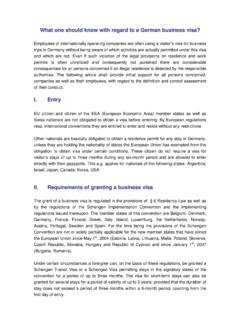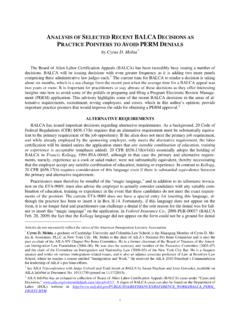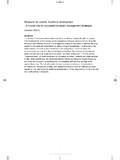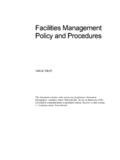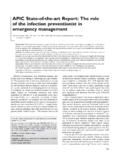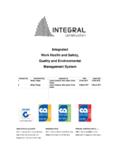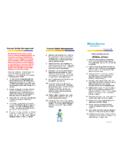Transcription of THE SHIFTING GLOBAL ECONOMIC ORDER AND ITS …
1 THE SHIFTING GLOBAL ECONOMIC ORDER AND ITS impact ON CORPORATE immigration A CANADIAN PERSPECTIVE by Kenneth Ing 1080-1188 West Georgia Street Vancouver, British Columbia, Canada V6E 4A2 Telephone: (604) 638-3838/Fax: (604) 629-3383 E-mail: These materials were prepared by Kenneth Ing of Porta immigration , with the assistance of Kit McGuinness, Vancouver, , Canada, for the International Bar Association Annual Conference held in Dubai, on November 3, 2011 INTRODUCTION The past decade has seen significant changes to the GLOBAL economy, including the continued rise of emerging ECONOMIC powers--Brazil, India, China, and Russia. This paper will examine how ECONOMIC changes in these BRIC countries have affected their corporate immigration policies from the government perspective. Furthermore, it will examine the laws and regulations of Canada: a stable, industrialized nation that has seen its own challenges and opportunities over the years with respect to corporate immigration policies.
2 BRIC COUNTRIES The following are some observations of the BRIC countries, from a Canadian perspective, so far as changes in immigration policies against the background changes in the GLOBAL economy. China China is divided into 23 provinces, five autonomous regions and four municipalities. Its immigration laws are largely carried out by provincial, regional, and municipal agencies, with oversight by several state ministries. There are significant variations in each locality s immigration structure, so a foreign national s destination in China will determine the relevant regional and local authorities involved and the immigration requirements and process. While the nature of the Chinese government system makes it difficult to anticipate changes in policy, a 2010 report by the Xinhua news agency suggests that China is currently looking to radically overhaul its immigration policy, and one of the main purposes of this is to attract foreign skilled workers, professionals, and investors.
3 If these changes come to fruition, this would signal a willingness to adapt to changing GLOBAL ECONOMIC conditions similar to India and Russia. India The Indian government has made changes to its immigration policies to take into account changing GLOBAL ECONOMIC conditions. The Indian Ministry of Home Affairs uses a system where workers can apply for a Business Visa ( B visa) or Employment Visa ( E visa), and recently eliminated the old 1% quota rule for all employment visa applications to a maximum of 20 foreign nationals per company. Changes to the visa rules, specifically with the E visa, have directly targeted highly skilled or professional workers, who must demonstrate that they will be paid a salary to at least $25,000 per year, in addition to meeting the other immigration rules. Russia Similar to China and India, Russia has made substantial changes to its immigration policies in ORDER to reflect GLOBAL ECONOMIC shifts.
4 The introduction of a Highly Skilled Worker category allows for a significantly faster and simpler immigration process for foreign nationals who are paid at least US$65,000 a year in Russia employed by Russian commercial companies, scientific, educational and medical institutions that have state accreditation, and branches of foreign legal entities. This requirement was lowered to roughly US$32,500 a year for scientists and teachers who meet certain criteria, including having been invited by the Russian government to work in that country and participate in research and/or teaching in state higher education institutions, academies. Moreover, these new rules have reduced or in some cases eliminated migration registration requirements for short stays. Brazil After examining the other BRIC countries, it would appear that Brazil has done the least, on a comparative basis, to implement more efficient corporate immigration policies for the purpose of facilitating foreign highly skilled workers.
5 Attaining a work visa in Brazil is a three-step process that can take up to a year to complete, and goes through both national and local bureaucratic structures. This is especially problematic, considering that the lack of skilled workers could prove to be a key obstacle to achieving long-term growth in Brazil. The Economist recently noted that there is a specific shortage of PhD-level workers there. While it is true that external factors, such as a stagnant economy in the latter half of the 20th Century and critically important language skills in Portuguese, have contributed to Brazil s isolation with respect to foreign workers, the seemingly archaic, confusing, and heavily bureaucratic immigration policies for skilled workers have not helped to alleviate these issues. CANADA In recent years, over 150,000 foreign workers each year enter Canada to work temporarily in jobs that help Canadian employers address skill shortages.
6 In general, Canada has developed its laws, regulations and rules in ORDER to facilitate the temporary entry into Canada for foreign nationals who are business persons and from selected categories of workers. Canada has entered into treaties with a number of countries, in ORDER to expand trade, and provide individuals with access to each other s country to sell, provide goods or services or trade and invest. Working Temporarily Without A Work Permit A foreign national may not need a work permit he or she falls into one of the following categories: Athletes and coaches Aviation accident or incident investigators Business visitors Civil aviation inspectors Clergy Convention organizers Crew members Emergency service providers Examiners and evaluators Expert witnesses or investigators Family members of foreign representatives Foreign government officers Foreign representatives Health-care students Judges, referees and similar officials Military personnel News reporters, film and media crews Performing artists Public speakers Students working on campus Business Visitors Business visitors do not need a work permit.
7 A business visitor is someone who comes to Canada to engage in international business activities without directly entering the Canadian labour market. A foreign national may qualify as a business visitor if he or she plans to visit Canada temporarily to look for new business opportunities, to invest or to advance existing business relationships. Business visitors usually stay in Canada for a few days or a few weeks. To be considered a business visitor, a foreign national must establish that: he or she intends to stay for less than six months and does not plan to enter the Canadian labour market his or her main place of business and source of income is located outside Canada profits from his or her business will accrue outside Canada he or she meets the basic entry requirements. These include: o having a valid travel document, such as a passport o having sufficient funds for his or her stay o plan to leave Canada at the end of the authorized stay o do not pose criminal, security or health risks to Canadians.
8 Cross-border business includes the following activities: buying Canadian goods or services for a foreign business or government taking orders for goods or services attending meetings, conferences, conventions or trade fairs providing after-sales service (mainly supervision, not hands-on labour) being trained by a Canadian parent company for which the foreign national works outside Canada training employees of a Canadian subsidiary of a foreign company being trained by a Canadian company that has sold to the foreign national equipment or services. Free Trade Agreements Business people include certain people entering Canada under the following free trade agreements: North American Free Trade Agreement (NAFTA) Other Free Trade Agreements General Agreement on Trade in Services (GATS) NAFTA Under Chapter 16 of NAFTA, citizens of Canada, the United States and Mexico can gain quicker, easier temporary entry into the three countries to conduct business or investment activities.
9 Business people covered by NAFTA do not need a labour market opinion from the labour department, Human Resources and Social Development Canada ( HRSDC ). This means that Canadian employers do not need to have a job offer approved by HRSDC to employ a United States or a Mexican business person, as set out in NAFTA. Business people covered by NAFTA must, however, comply with the general provisions on temporary entry to Canada. NAFTA applies to four specific categories of business people: business visitors, professionals, intra-company transferees, and traders and investors. Business visitor is a separate category with separate requirements. Business visitors do not require a work permit. A professional must: be qualified to work in one of the more than 60 professions listed in Appendix of Chapter 16 of NAFTA ( accountants, computer systems analysts, engineers, management consultants and technical publications writers) and have pre-arranged employment with a Canadian enterprise in an occupation that matches the qualification.
10 An intra-company transferee must: have worked continuously for at least one year in the preceding three years for the same or affiliated employer in the United States or Mexico be transferred to Canada to work temporarily for the same or an affiliated employer and work in a capacity that is managerial, executive or that involves specialized knowledge. A trader or an investor must: be seeking to carry out substantial trade in goods or services, mainly between Canada and her or his country of citizenship, or conduct substantial investment activities in Canada, in a supervisory or an executive capacity, or in a capacity that involves essential skills Other Free Trade Agreements Additional Free Trade Agreements (FTAs), such as the Canada-Chile FTA and the Canada-Peru FTA were modelled after the NAFTA, thereby making it easier for business persons from one country to temporarily enter the other country.

